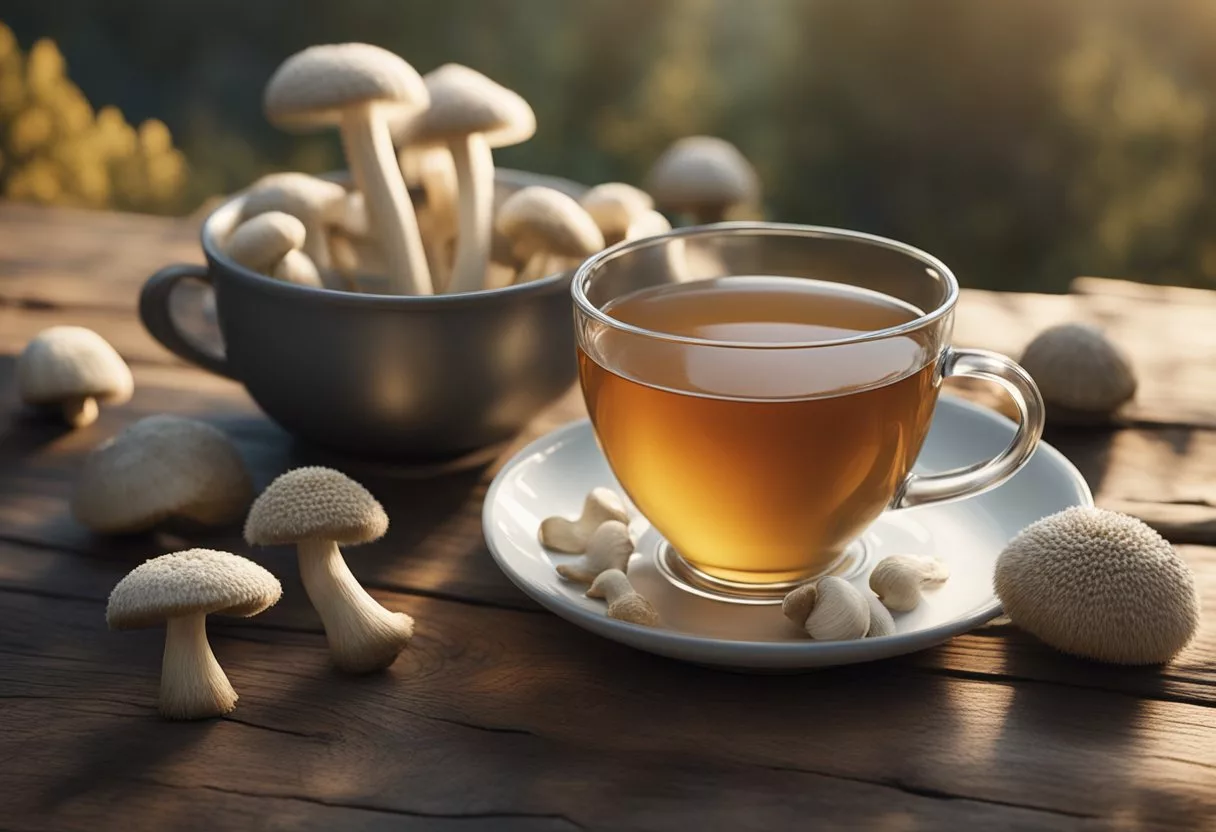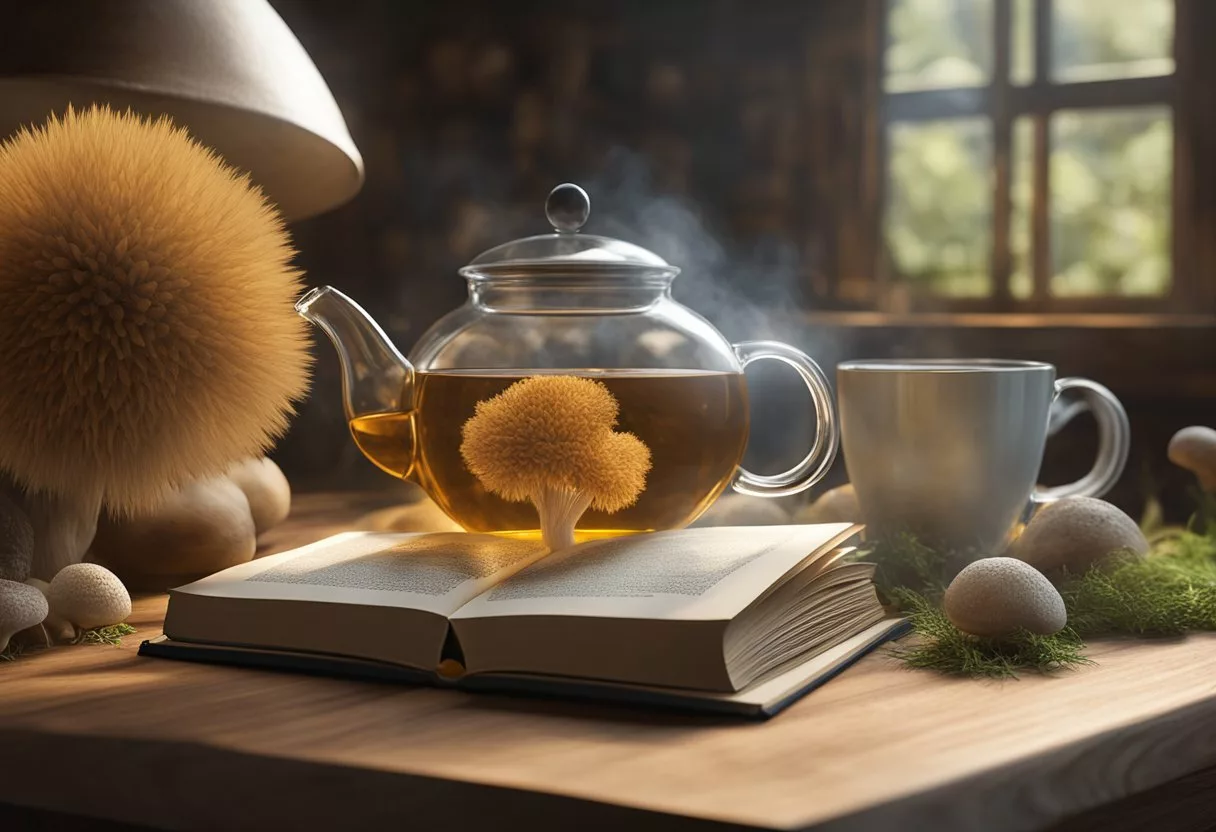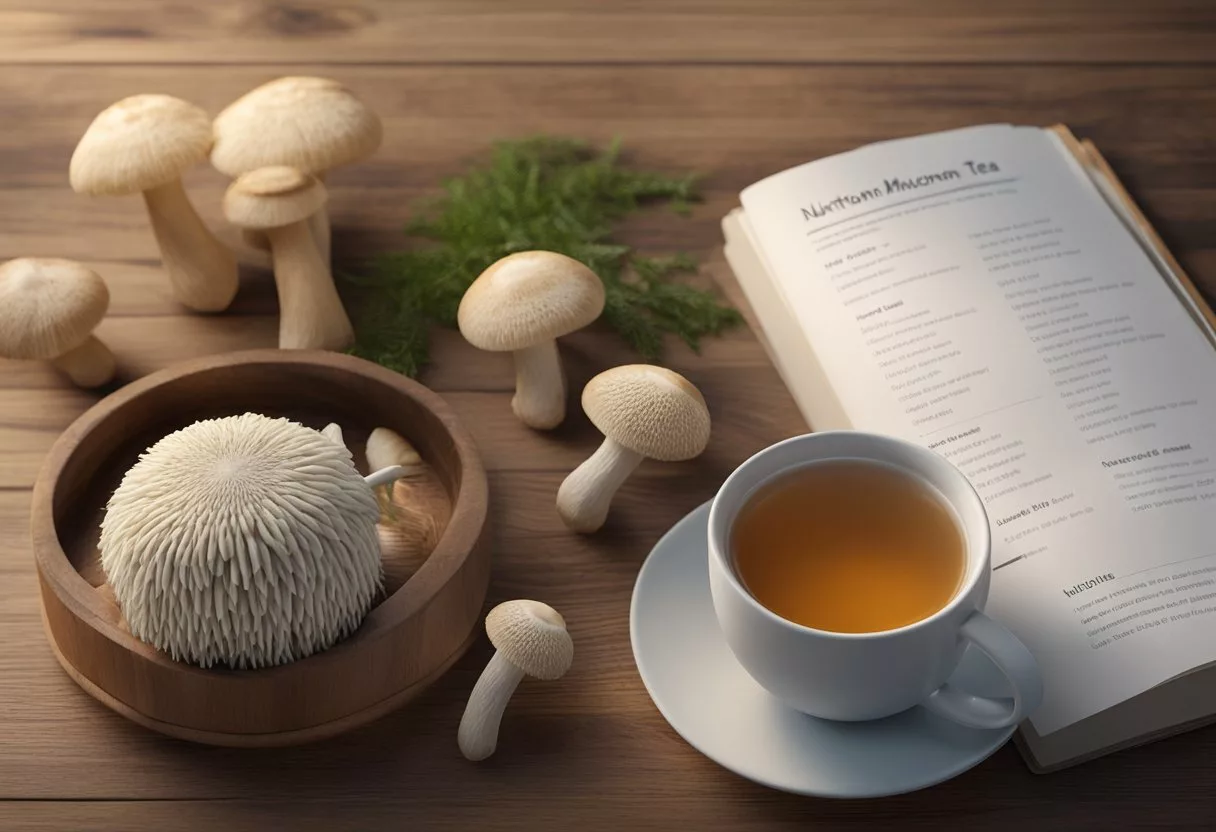Lion’s mane mushroom tea has become increasingly popular due to its potential health benefits and unique flavor. This edible mushroom is known for its possible ability to protect the brain, gut, and heart, making it a favorite among health enthusiasts. Preparing and enjoying this tea can be a soothing ritual that also supports overall wellness.

Making Lion’s mane mushroom tea at home is straightforward and can be done using fresh or dried mushrooms. By steeping the mushrooms in hot water, you can extract their beneficial compounds. This tea not only offers a mild, earthy taste but also provides potential cognitive and digestive benefits that many find appealing.
Whether you’re looking to boost your mental clarity or enjoy a relaxing herbal drink, Lion’s mane mushroom tea is worth trying. The process of brewing this tea is easy and can be a delightful addition to your daily routine.
Key Takeaways
- Lion’s mane mushroom tea offers potential health benefits, including brain and gut protection.
- Making the tea is simple using either fresh or dried mushrooms.
- The tea provides a mild, earthy flavor and potential cognitive benefits.
Historical and Cultural Significance

Lion’s Mane mushrooms have had a lasting impact on traditional medicine, culinary arts, and modern health practices. Their journey across cultures showcases their remarkable versatility.
Role in Traditional Chinese Medicine
Lion’s Mane mushrooms, known as Hericium erinaceus, have been used in Traditional Chinese Medicine (TCM) for thousands of years. In ancient China, they were prized for their ability to boost memory and support overall cognitive function. Healers often used them to treat digestive issues and promote general health.
These mushrooms were considered a symbol of longevity and vitality. By consuming Lion’s Mane, individuals hoped to maintain mental sharpness and enhance their immune system. The connection to Chinese Medicine highlights their longstanding therapeutic value. Some modern studies echo these traditional beliefs, suggesting Lion’s Mane may support nerve growth and brain health.
Culinary Uses Reflecting Flavor and Texture
Lion’s Mane mushrooms are also valued for their unique flavor and texture. They have a delicate, somewhat seafood-like taste, often compared to lobster or crab. This makes them a favored ingredient in various dishes within Asian cuisine.
The mushroom’s shaggy, white appearance adds a visually appealing element to culinary creations. Chefs use Lion’s Mane in soups, stir-fries, and teas. In China and Japan, they are frequently featured in traditional recipes. The mushrooms not only enhance the taste but also contribute to the dish’s nutritional profile. Their culinary applications reflect an appreciation for both their flavor and health benefits.
Global Spread and Modern Applications
Over time, Lion’s Mane mushrooms have gained popularity outside Asia. Today, they are known globally for their health benefits and culinary versatility. In the West, these mushrooms are found in dietary supplements, coffees, and herbal teas.
The interest in Lion’s Mane aligns with a broader trend of integrating natural remedies into modern wellness routines. Many people turn to these mushrooms for potential cognitive and immune support. This global spread indicates a growing recognition of their benefits, reinforcing their historical and cultural significance.
By examining their role in medicine and cuisine, one can appreciate the wide-reaching impact of Lion’s Mane mushrooms. From ancient traditions to contemporary uses, they continue to be a remarkable addition to diet and health practices.
Classification and Characteristics

Lion’s Mane Mushrooms, scientifically known as Hericium Erinaceus, belong to the tooth fungus group. They are notable for their unique appearance and long spines. These mushrooms are found across North America, Europe, and Asia, growing predominantly on hardwood trees.
Taxonomy of Hericium Erinaceus
Hericium Erinaceus falls under the kingdom Fungi. They belong to the division Basidiomycota, class Agaricomycetes, order Russulales, and family Hericiaceae. This taxonomy highlights their distinction from other mushrooms due to their unique structure and growth patterns.
Other names for this species include bearded tooth, bearded hedgehog, and old man’s beard. These names derive from their distinctive physical characteristics, making them easily identifiable among other fungi.
Physical Description of Fungi
These mushrooms have a notable physical appearance, characterized by long, white or cream-colored spines that hang down like icicles. The spines can grow longer than 1 centimeter (around half an inch).
They typically grow as single clumps on the trunks of hardwood trees such as oak or beech. This unique structure resembles a lion’s mane, which is how they got their common name. Besides their intriguing appearance, they are also valued for their culinary and medicinal uses.
Preparation of Lion’s Mane Mushroom Tea

Lion’s mane mushroom tea can be prepared using simple traditional methods or by infusing the tea with additional flavors like honey, cinnamon, ginger, and lemon. These methods enhance both the taste and the potential health benefits.
Traditional Hot Water Extraction
To make lion’s mane mushroom tea using the traditional hot water extraction method, you need dried lion’s mane mushrooms or lion’s mane powder. Start by boiling water and letting it cool for a minute to reach a simmering state, ideally around 90°C (194°F).
If you are using dried mushrooms, chop them into small pieces. For each cup of tea, use about 1-2 teaspoons of lion’s mane powder or a small handful of dried pieces. Place the mushrooms or powder in a tea infuser or directly in the cup.
Pour the hot water over the mushrooms. Let it steep for 10-15 minutes to extract the nutrients and flavors. Strain the tea if you used whole pieces, then enjoy your freshly brewed lion’s mane tea.
Infusion with Additional Flavors
Infusing lion’s mane mushroom tea with additional flavors like honey, cinnamon, ginger, and lemon can enhance its taste. Start by preparing the traditional hot water extraction method as described above.
Once your tea is steeped, add a teaspoon of honey for sweetness. Honey not only sweetens but also has its own health benefits. For a warm, spiced flavor, add a stick of cinnamon or a pinch of ground cinnamon to the cup.
Ginger can be added by grating a small piece of fresh ginger root or adding a half teaspoon of ginger powder. Ginger adds a zesty kick and is known for its digestive benefits. Lastly, a squeeze of fresh lemon juice can brighten the tea’s flavor, balancing the earthiness of the mushrooms with a touch of citrus.
Health Benefits
Lion’s mane mushroom tea offers a variety of health benefits, particularly in areas such as brain health, immune system support, digestive health, heart health, and inflammation reduction. This tea can help improve cognitive function, support immunity, enhance gut health, and more.
Cognitive Function and Brain Health
Lion’s mane mushroom is known for its potential to boost cognitive function and support brain health. This is partly due to its ability to stimulate the production of nerve growth factor (NGF), which plays a role in the growth and survival of neurons. Regular consumption may improve memory and protect against neurodegenerative diseases like Alzheimer’s.
Studies suggest that compounds in lion’s mane, such as hericenones and erinacines, promote neuron growth and enhance brain plasticity. These factors contribute to improved mental clarity and focus. Drinking lion’s mane tea may thus be an effective way to support overall brain health.
Immune System Support
Lion’s mane mushroom contains beta-glucans, which are compounds known to boost the immune system. These help the body fight off pathogens and diseases more effectively. Beta-glucans stimulate the activity of immune cells, like macrophages and natural killer cells, which play a role in defending the body against infections.
The mushroom’s antioxidants also contribute to immune health by reducing oxidative stress, which can damage cells. Drinking lion’s mane tea regularly may help enhance the body’s natural defense mechanisms, making it more resilient to illnesses.
Digestive and Gut Health
Lion’s mane mushroom supports digestive health and may improve gut function. It has been shown to reduce inflammation in the digestive tract and may help manage conditions like ulcerative colitis. The mushroom’s anti-inflammatory properties help calm the gut and reduce symptoms of digestive disorders.
Additionally, lion’s mane contains prebiotic fibers that can nourish the gut microbiome. A healthy gut microbiome is crucial for proper digestion and overall health. Drinking lion’s mane tea can aid in maintaining a balanced gut flora, which supports efficient digestion and nutrient absorption.
Heart Health and Blood Clotting
Lion’s mane mushroom may support heart health by influencing cholesterol levels. Studies have shown that it can lower LDL cholesterol and increase HDL cholesterol, which helps reduce the risk of heart disease. Keeping cholesterol levels in check is essential for maintaining a healthy cardiovascular system.
The mushroom also has properties that improve blood clotting. Compounds in lion’s mane can prevent excessive clot formation, thus lowering the risk of heart attacks and strokes. Consuming lion’s mane tea can offer cardiovascular benefits and promote overall heart health.
Anti-Inflammatory and Antioxidant Effects
Lion’s mane mushroom has strong anti-inflammatory and antioxidant effects. These properties help reduce chronic inflammation, a common cause of various health issues like arthritis and heart disease. Antioxidants in lion’s mane combat oxidative stress, protecting cells from damage caused by free radicals.
Regular consumption of lion’s mane tea can also help manage inflammatory conditions and support general well-being. Anti-inflammatory effects might help alleviate symptoms of autoimmune diseases and other chronic inflammatory disorders. The antioxidants play a key role in maintaining cellular health and longevity.
Nutritional Profile

Lion’s mane mushroom tea is not only praised for its unique flavor but also for its impressive nutritional content. This tea is packed with essential vitamins, minerals, protein, fiber, and bioactive compounds that may offer several health benefits.
Vitamins and Minerals Content
Lion’s mane mushrooms are rich in various vitamins and minerals. Notably, they contain potassium, which is crucial for maintaining healthy blood pressure levels. They also provide iron, essential for the transportation of oxygen in the blood.
These mushrooms are also known to have small amounts of other nutrients such as niacin (vitamin B3) and riboflavin (vitamin B2). These vitamins support energy production and the maintenance of healthy skin.
Protein and Fiber Contributions
The protein and fiber content in lion’s mane mushrooms can support digestive health and muscle maintenance. A 100g serving provides around 2.4 grams of protein. This protein amount can contribute to daily protein needs, especially in vegetarian diets.
In terms of fiber, they are low, but the fiber they contain can aid in digestion. This fiber supports gut health and helps in preventing constipation by ensuring smooth bowel movements.
Bioactive Compounds Presence
Lion’s mane mushrooms are rich in bioactive compounds like beta-glucans and polysaccharides. These compounds may play a role in boosting the immune system and reducing inflammation.
Other important bioactive components include hericenones and erinacines, which are studied for their potential neurological benefits. These compounds may help in protecting brain functions and promoting cognitive health.
For those seeking to enhance their diet with nutrient-dense foods, adding lion’s mane mushroom tea may be a valuable addition due to these beneficial properties.
Supplementation and Forms Available

Lion’s mane mushroom can be taken in various forms such as powders, extracts, capsules, and tinctures. Each form has its unique benefits and ways to be incorporated into daily routines effectively.
Powder and Extracts
Lion’s mane mushroom powder and extracts are commonly used due to their versatility. Powders can be added to smoothies, coffees, and teas, making it easy to integrate into different recipes. Extracts are often more concentrated, providing a powerful dose in smaller quantities.
Using mushroom powder ensures the preservation of most nutrients found in the mushroom. Extracts, particularly those that involve both ethanol and hot water extraction, tend to focus more on active compounds. This form is suited for people wanting a more intense and concentrated supplement experience.
Capsules and Tinctures
Capsules provide a convenient way to consume lion’s mane mushrooms without needing preparation. Each capsule contains a measured dose, allowing accurate and consistent intake. This is ideal for people who prefer a straightforward approach and don’t enjoy the taste of mushrooms.
Tinctures, which are liquid extracts, can be taken directly or added to drinks. They are absorbed quickly by the body and often come in dropper bottles for easy dosing. Both capsules and tinctures are portable, making them a good option for those who need to take their supplements on the go.
Incorporation into a Daily Routine
Incorporating lion’s mane mushroom into a daily routine can be effortless with the right strategies. For instance, adding a scoop of mushroom powder to your morning smoothie is a seamless way to start the day with a cognitive boost. Capsules can be taken along with other morning vitamins, simplifying the process.
Tinctures can be mixed into beverages like tea or coffee, providing flexibility in how the supplement is consumed. It’s important to develop a consistent routine to achieve the benefits, whether using powders, extracts, capsules, or tinctures. Regular consumption ensures a steady supply of beneficial compounds to support daily cognitive and immune functions.
Possible Side Effects and Considerations

Lion’s mane mushroom tea can offer some health benefits, but there are also risks to be aware of. Allergic reactions, potential drug interactions, and the need for medical advice should be considered before use.
Allergic Reactions and Digestive Response
Some people may experience allergic reactions to lion’s mane mushrooms. Symptoms can include itching, swelling, and skin rashes. In severe cases, breathing difficulties may occur, which would require immediate medical attention.
Digestive issues are another concern. Consumption of lion’s mane tea may lead to an upset stomach, diarrhea, or nausea. Those with a history of stomach ulcers or inflammatory bowel disease might find these symptoms more pronounced.
Interactions with Medications and Conditions
Lion’s mane mushroom tea can interact with certain medications and medical conditions. Those on medications for diabetes or blood pressure should be cautious. The mushroom’s compounds may enhance the effects of these medications, leading to dangerously low blood sugar or blood pressure levels.
There may also be a risk for individuals with stomach ulcers, or those treated for cancer. The mushroom’s impact on cancer cells and its potential to influence the effectiveness of chemotherapy treatments is still under study.
Consultation with a Healthcare Provider
Before adding lion’s mane mushroom tea to a daily routine, it is crucial to consult with a healthcare provider. This is particularly important for individuals with pre-existing conditions or those taking medication.
Discussing the use of lion’s mane tea with a healthcare provider ensures that any potential risks are thoroughly assessed. For individuals with a history of stroke, or infection with H. Pylori, medical advice is essential to prevent adverse reactions.
Talking to a healthcare provider can help in understanding the appropriate dosage and duration of use, making the experience with lion’s mane mushroom tea both safe and beneficial.
Procurement and Quality Considerations

When purchasing Lion’s Mane mushroom tea, it’s crucial to ensure you’re getting a quality product. This involves examining where to buy the tea, evaluating its purity, and verifying its quality through certificates of analysis.
Availability in Health Food Stores and Online
Lion’s Mane mushroom tea is available in many health food stores and supermarkets. These stores often stock a variety of mushroom products, including dried mushrooms, powders, and tea blends. Local health food stores may offer specialty brands known for higher quality.
Online retailers provide a broader selection, including international brands. Websites like Remeday offer comprehensive guides and purchasing options. When buying online, it’s easier to compare products, read reviews, and find detailed product information.
Assessment of Quality and Purity
Assessing the quality and purity of Lion’s Mane mushroom tea is essential. Look for products that clearly list their ingredients on the label. It’s important to note whether the tea is made from pure mushroom or if it includes fillers or additives.
Checking the source of the mushrooms can also indicate quality. Mushrooms cultivated on hardwood substrates, as highlighted in Health by Mushrooms, often mimic natural growing conditions and are considered superior. Organic certifications can also be a sign of higher quality.
Importance of Certificates of Analysis (CoA)
Certificates of Analysis (CoA) are vital in confirming the quality and purity of Lion’s Mane mushroom products. A CoA is a document provided by an independent lab that details the analytical results of testing.
Ensure that the product has a CoA available, which can often be found on the manufacturer’s website or by request. A reliable CoA will show the absence of contaminants such as heavy metals, pesticides, and other harmful substances. This transparency, emphasized by Natures Rise, is crucial in a market where regulation can be inconsistent.
Culinary Applications and Recipes

Lion’s mane mushroom tea is celebrated for its unique flavor and versatility in cooking. This section explores its resemblance to seafood, its role in vegan and vegetarian dishes, and creative pairing options with sweeteners and spices.
Comparison to Seafood Flavors
Lion’s mane mushrooms are often compared to seafood due to their unique flavor profile. Some say they mimic the taste and texture of lobster or crab.
This mushroom’s meaty and tender consistency makes them a popular choice among those looking for a seafood substitute. Chefs recommend sautéing the mushrooms in butter or olive oil to bring out their rich, savory taste.
Lion’s mane mushrooms can be used in dishes such as lobster bisque or a seafood stir-fry. Pair them with ingredients like garlic and lemon for a more authentic seafood experience.
Crafting Vegan and Vegetarian Dishes
Lion’s mane mushrooms are a fantastic ingredient for those on vegan or vegetarian diets. They provide a meaty, satisfying texture that can replace meat or seafood in various dishes.
For a vegan twist, try making a vegan “crab” cake using mashed lion’s mane mushrooms, breadcrumbs, and various seasonings.
Vegetarians can enjoy lion’s mane mushroom pasta dishes or tacos. The mushrooms can be grilled or roasted, making them a versatile addition to salads or wraps.
They also work well in stir-fries and soups, adding both flavor and nutrition to plant-based meals.
Creative Pairings with Sweeteners and Spices
Pairing lion’s mane mushrooms with different sweeteners and spices can enhance their unique taste. Raw honey and coconut sugar can add a touch of sweetness to mushroom dishes.
Experiment with spices like turmeric, ginger, and cinnamon to add depth and complexity to your meals.
For a sweet-savory combination, you can incorporate lion’s mane mushrooms into dessert recipes. Consider making a mushroom-infused honey or a spiced mushroom tea using lion’s mane.
These creative pairings can elevate both the tea and the mushroom dishes, offering a delightful culinary experience.
Cultural Perception and Future Trends

Lion’s mane mushroom tea has deep roots in traditional medicine and is gaining attention in modern research for its potential neurological benefits. As its popularity grows, it is becoming a significant player in the wellness market.
Lion’s Mane in Alternative Medicine
Lion’s mane has a longstanding history in alternative medicine, especially in East Asia. In traditional Chinese medicine, it has been used for promoting longevity and improving cognitive function. The mushroom’s reputation as a medicinal mushroom dates back to 3000 BCE.
In Japan, it has also been noted as a tonic for the nervous system. This widespread use in ancient remedies shows a consistent belief in lion’s mane’s adaptogenic qualities. The ongoing interest highlights the mushroom’s established and evolving role in traditional health practices globally.
Emerging Research on Neurological Benefits
Recent studies are exploring lion’s mane’s impact on cognitive health, focusing on conditions like Alzheimer’s and dementia. Research suggests that the mushroom may help improve symptoms of cognitive impairment and sleep disorders. Components in lion’s mane have shown promise in stimulating nerve growth factor (NGF) production, essential for brain health.
A study found potential benefits for both acute and chronic neurological conditions. These findings, though still in early stages, are paving the way for more comprehensive research into its therapeutic potential.
Rising Popularity in Western Markets
Lion’s mane mushroom tea is becoming increasingly popular in Western markets. Health enthusiasts are drawn to its alleged cognitive benefits, and it is now featured in a variety of wellness products. Interest in adaptogenic and medicinal mushrooms like reishi and lion’s mane is growing rapidly.
This trend is fueled by a desire for natural supplements that support mental clarity and overall well-being. As more people seek natural ways to enhance their health, lion’s mane tea is set to become a staple in many households. This shift towards natural health solutions signifies a broader acceptance and demand for traditional wisdom in contemporary wellness practices.
Frequently Asked Questions

Lion’s mane mushroom tea is known for its unique, shaggy appearance resembling a lion’s mane. Many people are curious about its health benefits, homemade recipes, reviews, purchase options, side effects, and specific effects on the body.
What are the potential health benefits of consuming lion’s mane mushroom tea?
Lion’s mane mushroom is believed to support brain health and cognitive functions. Research suggests it may help reduce inflammation and oxidative stress. Additionally, it might promote nerve growth and improve mental clarity.
Can you provide a recipe for making lion’s mane mushroom tea at home?
Sure! Heat plant milk or water over the stove. Add this liquid, a serving of lion’s mane mushroom powder, and golden milk powder to a blender cup. Blend for 7 seconds. Pour and sprinkle with cinnamon if desired. For a traditional recipe, simply boil three cups of water, add 1.5 teaspoons of lion’s mane powder, and simmer for 15-20 minutes.
What are the common reviews from people who have tried lion’s mane mushroom tea?
Many people report improved focus and mental clarity after drinking lion’s mane tea. Some users also notice enhanced memory and reduced anxiety. The tea’s earthy flavor is often well-received, and the addition of cinnamon or plant milk can make it even more enjoyable.
Where can one purchase lion’s mane mushroom tea?
Lion’s mane mushroom tea can be purchased online from various health food websites and specialty stores. Popular options include Wild Foods and Remeday. It is important to choose a reputable source to ensure quality and purity.
Are there any known side effects associated with consuming lion’s mane mushroom tea?
Most people tolerate lion’s mane mushroom tea well. However, some individuals may experience mild side effects like stomach discomfort or allergic reactions. It’s advisable to start with a small amount to gauge your body’s response.
What specific effects does lion’s mane mushroom have on the human body?
Lion’s mane mushroom is known to promote nerve growth factor (NGF) production, which supports brain health. It may also help improve digestion, reduce inflammation, and boost the immune system. Its compounds potentially enhance mood and cognitive functions.